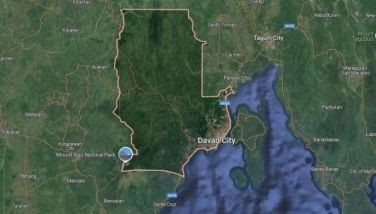Abubakar now a peace zone
September 3, 2006 | 12:00am
BARIRA, Maguindanao — Rebuilding Camp Abubakar, which is known as the heart of the secessionist movement, is a big challenge to local residents but they have much to show for their efforts in the last six years.
Through the Gawad Kalinga and religious and political leaders led by Barira Mayor Alexander Tomawis, the town has built almost 300 colorful houses for farmers and their dependents, right where soldiers and Moro Islamic Liberation Front (MILF) rebels fought each other for nearly two weeks in 2000.
The lands where MILF members are now peacefully residing are now crisscrossed by 62 kilometers of all-weather, interconnected farm-to-market roads built by the Army’s 54th Engineering Brigade.
The most tangible project implemented jointly by local officials and Army engineers is the 14-kilometer concrete highway connecting the former command base of the MILF in Barangay Tugaig here to a portion of the Secretary Narciso Ramos Highway in Barangay Langkong in nearby Matanog, Maguindanao.
On July 9, 2000, Camp Abubakar, which covers more than half of this town, fell to government control after almost a month of air, artillery and ground offensives that left dozens of soldiers and MILF fighters dead.
It was here where the former chieftain of the MILF, the late Egyptian-trained preacher Hashim Salamat, built an enclave showcasing his concept of a puritan Islamic state.
Tomawis, an ethnic Iranon, said they ought to thank President Arroyo, the Armed Forces ot the Philippines, the World Bank, the United States Agency for International Development, and all the foreign donors that helped rebuild this town into a progressive "peace zone," where a newly built town hall now stands.
Tomawis said the fraternalism of residents here started to become imminent when the humanitarian entity Gawad Kalinga started building villages for local residents, many of whom were members of the MILF.
Corn farmer Tariq Makasasa, 39, said it was their involvement in the construction of farm-to-market roads and low-cost houses for impoverished people here that they have learned the importance of recognizing the legitimacy of government, not as an enemy, but as bearer of peace and sustainable development.
"The government, before, was nothing but an enemy...We are thankful that Barira had been converted into a peace zone," Makasasa told The Star in the Iranon dialect.
Autonomous Region in Muslim Mindanao Gov. Zaldy Ampatuan, chairman of the ARMM’s Regional Economic Planning and Development Board, has assured the implementation of various projects to improve the productivity of farmers.
Records obtained from the municipal treasury showed a five-fold increase in the collection of local taxes during the past three years.
"It’s safer here in Barira than in Metro Manila. We don’t have kidnappings here. We don’t have drug pushers and prostitution dens here," a farmer’s wife, Aminah Sansaruna, 46, said in Filipino.
Through the Gawad Kalinga and religious and political leaders led by Barira Mayor Alexander Tomawis, the town has built almost 300 colorful houses for farmers and their dependents, right where soldiers and Moro Islamic Liberation Front (MILF) rebels fought each other for nearly two weeks in 2000.
The lands where MILF members are now peacefully residing are now crisscrossed by 62 kilometers of all-weather, interconnected farm-to-market roads built by the Army’s 54th Engineering Brigade.
The most tangible project implemented jointly by local officials and Army engineers is the 14-kilometer concrete highway connecting the former command base of the MILF in Barangay Tugaig here to a portion of the Secretary Narciso Ramos Highway in Barangay Langkong in nearby Matanog, Maguindanao.
On July 9, 2000, Camp Abubakar, which covers more than half of this town, fell to government control after almost a month of air, artillery and ground offensives that left dozens of soldiers and MILF fighters dead.
It was here where the former chieftain of the MILF, the late Egyptian-trained preacher Hashim Salamat, built an enclave showcasing his concept of a puritan Islamic state.
Tomawis, an ethnic Iranon, said they ought to thank President Arroyo, the Armed Forces ot the Philippines, the World Bank, the United States Agency for International Development, and all the foreign donors that helped rebuild this town into a progressive "peace zone," where a newly built town hall now stands.
Tomawis said the fraternalism of residents here started to become imminent when the humanitarian entity Gawad Kalinga started building villages for local residents, many of whom were members of the MILF.
Corn farmer Tariq Makasasa, 39, said it was their involvement in the construction of farm-to-market roads and low-cost houses for impoverished people here that they have learned the importance of recognizing the legitimacy of government, not as an enemy, but as bearer of peace and sustainable development.
"The government, before, was nothing but an enemy...We are thankful that Barira had been converted into a peace zone," Makasasa told The Star in the Iranon dialect.
Autonomous Region in Muslim Mindanao Gov. Zaldy Ampatuan, chairman of the ARMM’s Regional Economic Planning and Development Board, has assured the implementation of various projects to improve the productivity of farmers.
Records obtained from the municipal treasury showed a five-fold increase in the collection of local taxes during the past three years.
"It’s safer here in Barira than in Metro Manila. We don’t have kidnappings here. We don’t have drug pushers and prostitution dens here," a farmer’s wife, Aminah Sansaruna, 46, said in Filipino.
BrandSpace Articles
<
>
- Latest
- Trending
Trending
Latest
Trending
Latest
Recommended
































